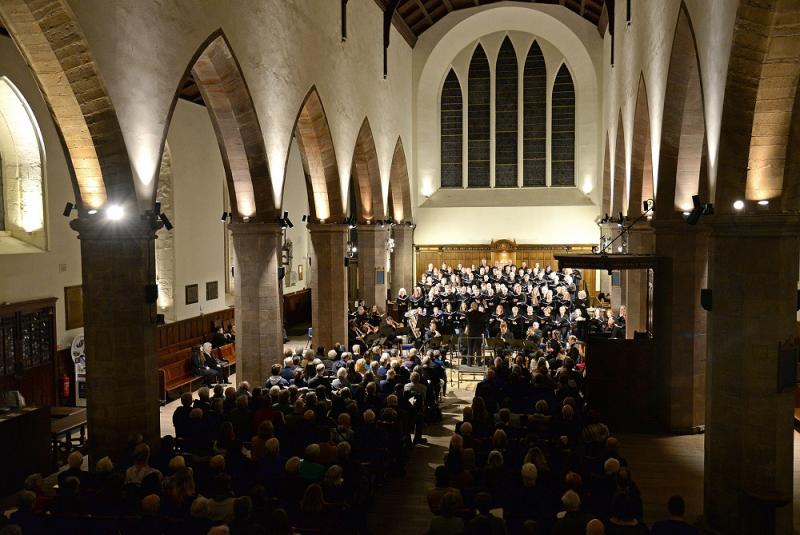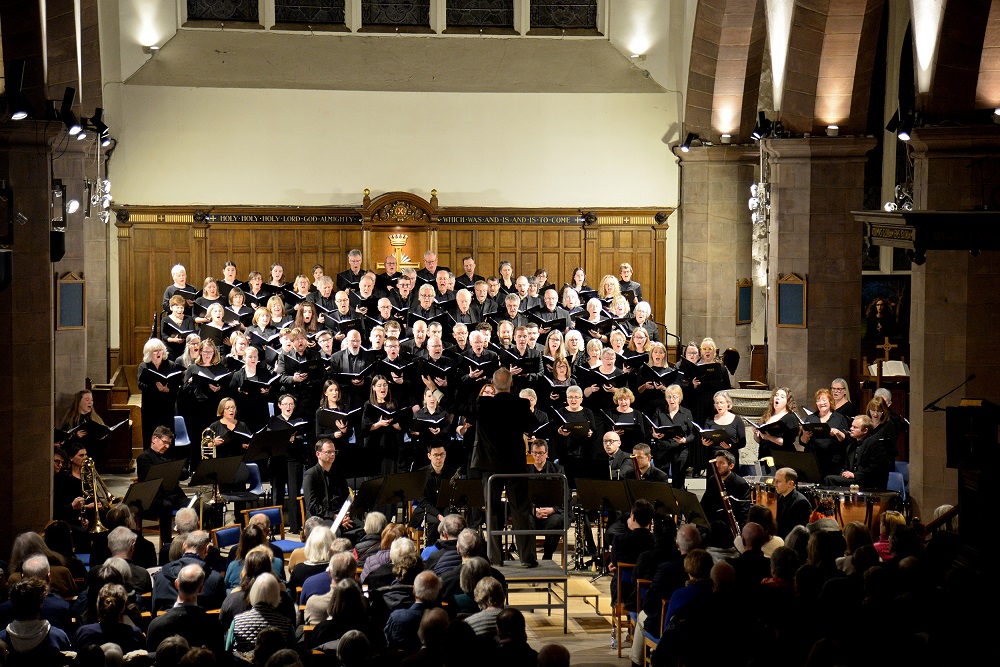RSNO Chorus, Doughty, Greyfriars Kirk, Edinburgh review - breaking out in anniversary Bruckner | reviews, news & interviews
RSNO Chorus, Doughty, Greyfriars Kirk, Edinburgh review - breaking out in anniversary Bruckner
RSNO Chorus, Doughty, Greyfriars Kirk, Edinburgh review - breaking out in anniversary Bruckner
A motet and a mass sometimes needed more focus, but a rare suite proved a delight

The Scottish Chamber Orchestra Chorus has a well-established concert life away from the main orchestra; the Royal Scottish National Orchestra Chorus less so. So it was refreshing to get to hear them going it (almost) alone in Edinburgh’s Greyfriars Kirk, and the Bruckner anniversary gave them a good excuse, building their programme around a motet and the E minor Mass.
Distinctive choral concerts like this are good for any choir because it encourages them to push out on their own a bit and gives them more exposure, as well as more repertoire. This concert showcased a lot of their strengths, even if it also showed where there’s work still to be done.
The RSNO Chorus is significantly bigger than the SCO’s, and you can’t expect the pinprick precision of a chamber chorus from a large scale symphony chorus like this. Even allowing for that, there was a little too much air between the notes in their singing of Bruckner’s Os justi, with some unfocused entries and unclear ensemble. That also haunted much of their singing of the mass: vocal lines had a tendency to collide with one another during the busier sections of the Credo and Gloria, and the opening of the Sanctus needed to sound less foggy, more ethereal. Likewise, it took a while for them to find their focus in Brahms’ Begräbnisgesang, which had a draughty opening that took time to settle.  Once they got going, however, they could sound great. The Brahms reached soaring heights of solemnity in its invocation of the hereafter, capturing the acoustic of the church in a way that was so powerful that it almost strained the ear. Furthermore, the great declarations of faith in the Mass rang thrillingly in the climaxes, the affirmations bringing out the best in both the composer and the singers. Conductor Stephen Doughty always kept a solid handle on things so that when things did lose focus he always brought them together again capably.
Once they got going, however, they could sound great. The Brahms reached soaring heights of solemnity in its invocation of the hereafter, capturing the acoustic of the church in a way that was so powerful that it almost strained the ear. Furthermore, the great declarations of faith in the Mass rang thrillingly in the climaxes, the affirmations bringing out the best in both the composer and the singers. Conductor Stephen Doughty always kept a solid handle on things so that when things did lose focus he always brought them together again capably.
The one unadulteratedly excellent thing about the Mass was the playing of the RSNO brass and winds, whose airy textures felt like an extension of the singing at places, mirroring it and expanding it in the church’s acoustic. They also provided the evening’s unexpected hit, the piece I was humming as I left the concert: Arnold Mendelssohn’s Suite for Woodwind, Brass and Percussion. Arnold’s father was the cousin of Felix Mendelssohn, and Erik Levi’s programme note compared his Suite to a 20th century reimagining of Mozart’s wind serenades. Heard like that it all makes sense, a terrifically catchy suite of dance movement that included wistful melancholy, a busy Scherzo, and a finale that feels like a superhero’s theme tune. It’s positive and, at times, terrifically buoyant, incredibly so when you consider it was written during the First World War. The wind soloists played it with vigour, bounce and what sounded like new-found affection. If so, their enthusiasm for it was infectious: I ended up loving it, too.
rating
Explore topics
Share this article
The future of Arts Journalism
You can stop theartsdesk.com closing!
We urgently need financing to survive. Our fundraising drive has thus far raised £49,000 but we need to reach £100,000 or we will be forced to close. Please contribute here: https://gofund.me/c3f6033d
And if you can forward this information to anyone who might assist, we’d be grateful.

Subscribe to theartsdesk.com
Thank you for continuing to read our work on theartsdesk.com. For unlimited access to every article in its entirety, including our archive of more than 15,000 pieces, we're asking for £5 per month or £40 per year. We feel it's a very good deal, and hope you do too.
To take a subscription now simply click here.
And if you're looking for that extra gift for a friend or family member, why not treat them to a theartsdesk.com gift subscription?
more Classical music
 Appl, Levickis, Wigmore Hall review - fun to the fore in cabaret and show songs
A relaxed evening of light-hearted fare, with the accordion offering unusual colours
Appl, Levickis, Wigmore Hall review - fun to the fore in cabaret and show songs
A relaxed evening of light-hearted fare, with the accordion offering unusual colours
 Lammermuir Festival 2025, Part 2 review - from the soaringly sublime to the zoologically ridiculous
Bigger than ever, and the quality remains astonishingly high
Lammermuir Festival 2025, Part 2 review - from the soaringly sublime to the zoologically ridiculous
Bigger than ever, and the quality remains astonishingly high
 BBC Proms: Ehnes, Sinfonia of London, Wilson review - aspects of love
Sensuous Ravel, and bittersweet Bernstein, on an amorous evening
BBC Proms: Ehnes, Sinfonia of London, Wilson review - aspects of love
Sensuous Ravel, and bittersweet Bernstein, on an amorous evening
 Presteigne Festival 2025 review - new music is centre stage in the Welsh Marches
Music by 30 living composers, with Eleanor Alberga topping the bill
Presteigne Festival 2025 review - new music is centre stage in the Welsh Marches
Music by 30 living composers, with Eleanor Alberga topping the bill
 Lammermuir Festival 2025 review - music with soul from the heart of East Lothian
Baroque splendour, and chamber-ensemble drama, amid history-haunted lands
Lammermuir Festival 2025 review - music with soul from the heart of East Lothian
Baroque splendour, and chamber-ensemble drama, amid history-haunted lands
 BBC Proms: Steinbacher, RPO, Petrenko / Sternath, BBCSO, Oramo review - double-bill mixed bag
Young pianist shines in Grieg but Bliss’s portentous cantata disappoints
BBC Proms: Steinbacher, RPO, Petrenko / Sternath, BBCSO, Oramo review - double-bill mixed bag
Young pianist shines in Grieg but Bliss’s portentous cantata disappoints
 theartsdesk at the Lahti Sibelius Festival - early epics by the Finnish master in context
Finnish heroes meet their Austro-German counterparts in breathtaking interpretations
theartsdesk at the Lahti Sibelius Festival - early epics by the Finnish master in context
Finnish heroes meet their Austro-German counterparts in breathtaking interpretations
 Classical CDs: Sleigh rides, pancakes and cigars
Two big boxes, plus new music for brass and a pair of clarinet concertos
Classical CDs: Sleigh rides, pancakes and cigars
Two big boxes, plus new music for brass and a pair of clarinet concertos
 Waley-Cohen, Manchester Camerata, Pether, Whitworth Art Gallery, Manchester review - premiere of no ordinary violin concerto
Images of maternal care inspired by Hepworth and played in a gallery setting
Waley-Cohen, Manchester Camerata, Pether, Whitworth Art Gallery, Manchester review - premiere of no ordinary violin concerto
Images of maternal care inspired by Hepworth and played in a gallery setting
 BBC Proms: Barruk, Norwegian Chamber Orchestra, Kuusisto review - vague incantations, precise laments
First-half mix of Sámi songs and string things falters, but Shostakovich scours the soul
BBC Proms: Barruk, Norwegian Chamber Orchestra, Kuusisto review - vague incantations, precise laments
First-half mix of Sámi songs and string things falters, but Shostakovich scours the soul
 BBC Proms: Alexander’s Feast, Irish Baroque Orchestra, Whelan review - rapturous Handel fills the space
Pure joy, with a touch of introspection, from a great ensemble and three superb soloists
BBC Proms: Alexander’s Feast, Irish Baroque Orchestra, Whelan review - rapturous Handel fills the space
Pure joy, with a touch of introspection, from a great ensemble and three superb soloists
 BBC Proms: Moore, LSO, Bancroft review - the freshness of morning wind and brass
English concert band music...and an outlier
BBC Proms: Moore, LSO, Bancroft review - the freshness of morning wind and brass
English concert band music...and an outlier

Add comment